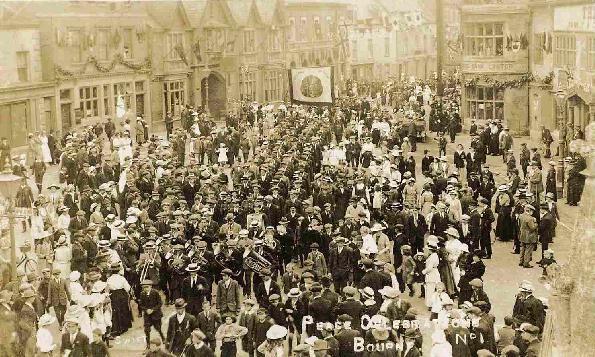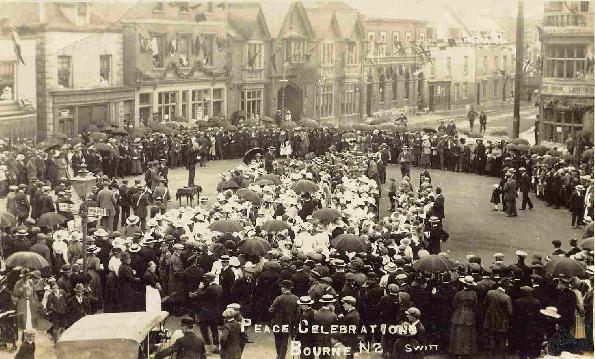|
The Great War peace celebrations The armistice which was signed on Monday 11th November 1918 ended the Great War and brought unprecedented scenes of public revelry and rejoicing throughout Britain and, as one observer remarked, the country became "like a giant school let out on holiday". Victory Day began quietly under grey and sombre skies and then at 11 o'clock precisely, as the armistice took effect, the church bells started pealing and the people flocked out into the streets while boy scouts sounded the all clear on their bugles. There was continual cheering and flag waving as a war weary Britain celebrated and every available serviceman was hoisted shoulder high and carried through the streets and soon there were dancing and fireworks to add to the celebrations. In Bourne, flags were soon flying in all parts of the town as the news began to circulate. Hundreds thronged the Market Place. Factories and offices closed down for the day, street lights that had been subdued for the duration were unmasked and blackout curtains and covers discarded. Rigid licensing laws imposed to deter drinking during the war years were ignored and the public houses were packed until nightfall and many ran out of beer. Tuesday was a day of thanksgiving services. Ministers from all churches in the town met at the vicarage and arranged for a united service at the Abbey Church at 12.15 pm. It was well attended and conducted by the Rev H Drake. Lessons were read by other ministers including the Rev J Bateman and the Rev J Carvath and prayers were offered by the Rev J Comyn Jones. The service included the Te Deum and hymns of a national thanksgiving character with Mr W Leary at the organ. There was also largely attended service at the Congregational Church conducted by the Rev J Comyn Jones, closing with the singing of the national anthem, and services at other free churches in the town during the evening with a second service at the Abbey Church. The official celebrations were held the following year, on Saturday 19th July 1919, after several weeks of planning, and the town suitably responded to the release from four years of war and the accompanying fear and restrictions. The Stamford Mercury reported the following Friday: The peace celebrations commenced with a procession from the Market Place, soldiers still serving taking the lead followed by those who had been discharged and disabled, with a sprinkling of those still in khaki, whilst ex-prisoners of war were among the number. The fire brigade also attended, the members of the General Johnson Society and Manchester United Oddfellows with their banner. The procession, certainly, was not so large as had been anticipated. The principal streets of the town were paraded. Hundreds of people assembled on the Abbey Lawn for the united service at noon. The band was in attendance and the church bells rang periodically during the day. The singing of the selected hymns was of a hearty character. The Rev H G Drake, the Baptist minister, offered an appropriate prayer, and the lesson was read by the Rev James Carvath; the Vicar, the Rev H Cotton Smith, following with an appropriate address. At the close, the National Anthem was sung. An interesting ceremony after the service was the presentation to about twenty former Red Cross nurses who had laboured unselfishly at the Bourne Military Hospital during the war. The presentation took the form of a gold bar brooch with a Red Cross on a white lozenge inside a circle with the inscription "Bourne V A D Hospital, 1914-18." The following were the recipients: Miss Gibson, Mrs Cabourn, Miss Cartwright (Grimsthorpe), Mrs R A Collins, Miss Cooper (Dyke), Mrs J Galletly, Miss Hinson, Miss Mays, Mrs D S Paton, Mrs E Pearce, Miss Pool, Mrs Redshaw (Dyke), Miss Scotney, Miss Shilcock and Miss Story. The following were also recipients of similar brooches in recognition of assiduous work: Miss Lunn, Miss Andrew, Miss A Bell (Thurlby), and Mrs E Holland. All, excepting where otherwise stated, reside in Bourne. In the unavoidable absence of the Countess of Ancaster, the presentations were made by Dr W J Gilpin OBE, who spoke of the ungrudging spirit with which womankind had taken their part in the war. A no less popular incident took place subsequent to the presentation to the nurses - that of War Certificates to local soldiers who have been awarded medals. Councillor F E Wherry, chairman of Bourne Urban District Council, performed this pleasing duty. The following is a list of Bourne boys who have won medals:
Sapper A W Pick - Military Medal
*This may be incorrect and should
probably refer to Herbert Kelby who was awarded the Distinguished Conduct
Medal for bravery in France during the spring of 1916 when he
was a lance corporal serving with the Lincolnshire Regiment. See link at
end. Several of the men were present to receive the gift from the town whilst those absent will receive such by post. Rounds of applause went up as the "boys" received their gifts. Some 300 men, soldiers and ex-soldiers, were entertained to dinner in the Corn Exchange. The catering was superintended by Messrs J B Shilcock, G Nash and J T Holmes, and many other ladies and gentlemen waiting upon the diners. Councillor G H Mays, president of the Soldiers' and Sailors' Federation, gave the loyal toasts and expressed sorrow for those men who had fallen in the fight but the town offered their heartiest congratulations to those who had returned. Rounds of lusty cheers were then given for Mr Mays and the caterers and waiters. Subsequently the children marched to the Abbey Lawn and sang with an enthusiastic fervour (Mr Alf Stubley conducting) an excellent composition entitled "A Song for Lincolnshire" from the able pen of Mr J J Davies, the popular local author and schoolmaster, to the tune of The Lincolnshire Poacher. An impressive moment during the afternoon's proceedings was a silent tribute to the dead heroes of Bourne. Later in the afternoon, tea was provided for the children on the Abbey Lawn and it is estimated that between 900 and 1,000 were present, a large committee of ladies serving as waiters. Peace medals were also presented to the children of the Abbey Church Sunday School who did not receive one on the occasion of the peace thanksgiving service recently. There was an odd shower or two during the day, but not sufficient to cause inconvenience until about five o'clock. The sports programme, however, had to be abandoned. For the excellent arrangements, special thanks are due to Mr F H Sones who acted in the capacity of honorary secretary. The sports took place on Tuesday evening, the first available time the band could attend. The events were principally confined to the juveniles and the prize money was distributed by Mr G H Mays. Dancing was indulged in, and about 10 o'clock a display of rockets was witnessed by a large crowd. In place of the bonfire some flares were provided. The celebrations were a lively occasion because later in the evening there were some incidents of unruly behaviour and the captain of the town fire brigade subsequently reported: "A mob broke into the yard and took three barrels of tar and five old barrels and tried to set all the material on fire", an echo of similar events in the past when the rolling of lighted tar barrels down the street was a common occurrence, particularly during the celebrations to mark the end of the Boer War in 1902. The disturbances continued after midnight and although there was no serious damage, the brigade remained on duty until three o'clock the following morning but their dedication to duty went unrewarded because Bourne Urban District Council decided that the ten firemen should only be paid at the usual rate. The list of medal winners read out during the celebrations should also have included Private L R Leonard Hind, son of Mr and Mrs Robert Hind of West Street, Bourne, who was awarded the Military Medal in 1918 but for some unexplained reason, his name was not among them. The official notification for which the award was granted said: "For conspicuous gallantry and devotion on the 9th October 1918, when his battalion attacked Fresnoy-le-Grand, and during subsequent operations on 10th October 1918. This man, who is employed as a runner at battalion headquarters, was on duty carrying messages under heavy shell fire continuously for nearly 36 hours. His courage and determination on the night of October 9th, when Fresnoy-le-Grand was very heavily shelled, was most marked. He never failed to deliver his messages and his services cannot be too highly spoken of and the splendid example he set to all ranks."
See also *Lance Corporal Herbert Kelby DCM The War Memorial
Go to: Main Index Villages Index
|

